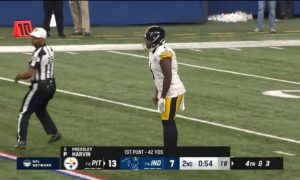So it turns out that there is a downside to having an Australian punter: they might get deported. Jordan Berry, the Pittsburgh Steelers’ third different Australian punter in recent years, was facing the prospect of being required to return to the homeland while his work visa was renewed, a process that would have taken an unknown amount of time.
This was why Berry, who was scheduled to be a restricted free agent, was signed in advance, he told ESPN’s Jeremy Fowler, while their other restricted free agents who were tendered contracts—namely kicker Chris Boswell and outside linebacker Anthony Chickillo—had to wait until the last minute.
By signing him to a contract in advance, the Steelers were able to allow their punter to avoid the prospect of being forced to return to Australia until his visa was renewed. Of course it was not an entirely altruistic act. They will be needing him next month as Phase One of the offseason program commences.
Of more immediate importance to him is the fact that he is getting married, stateside, in May. Could you imagine how deep in the doghouse he would be at the start of his marriage if he missed his own wedding?
The whole story is notable for those who were curious about the hows and whys of Berry’s deal. If he was going to be a restricted free agent, then why would the Steelers sign him to a one-year contract that was right around the ballpark figure of the tender?
The Steelers signed him to a one-year contract at the start of February that was worth $1.887 million. Perhaps that was their projection of what the original-round restricted tender would be. He told Fowler that there was a clause in the contract stating that his salary “would increase to meet the tender he was originally set to receive”, Fowler wrote, and we indeed saw that change reflected at the start of the new league year.
Fowler also wrote that he spoke with “a source with knowledge of NFLPA contracts”, who told him that while the circumstances are uncommon, there are cases in which teams receive exemptions for special cases.
What I remain somewhat unclear on is whether or not the contract that he signed was technically the tender, which is what Berry seems to imply when he tells Fowler, “we did the tender before the tender”. The value of the restricted free agent tenders was not official until the salary cap figure was released shortly before the start of the new league year.
Ultimately, it’s neither here nor there and works out the same in the end, but if you were like me and found it curious that the Steelers gave Berry a deal like this, perhaps you will receive some satisfaction in learning that there was a legitimate reason behind it.








